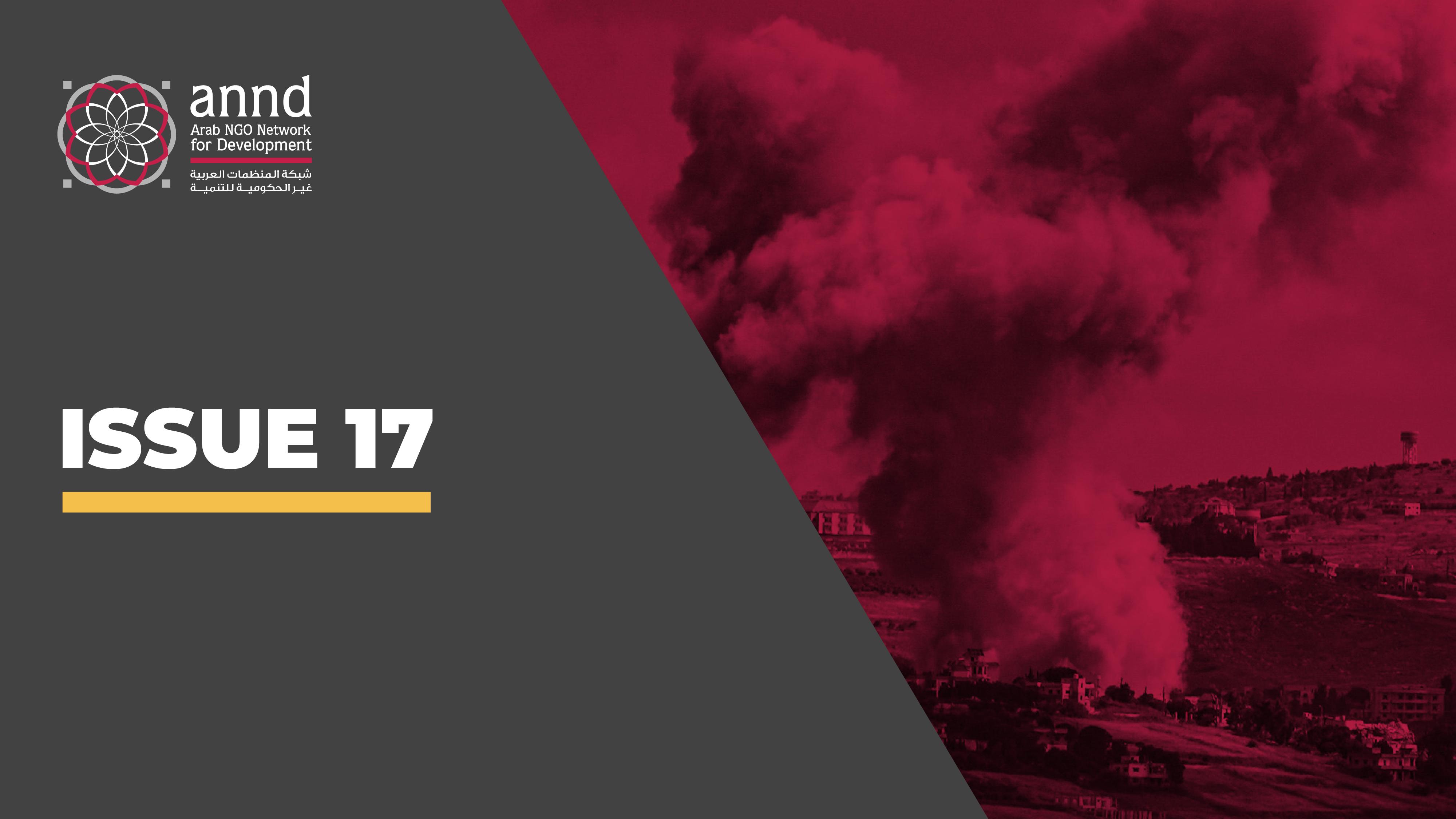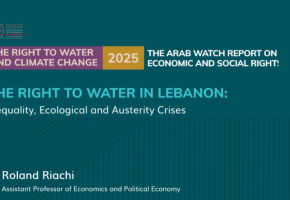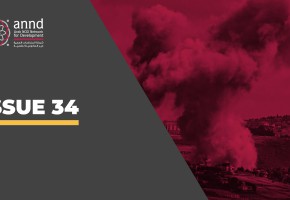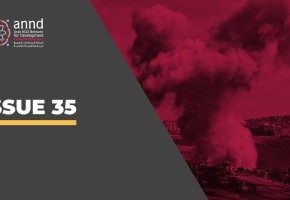A Region on Fire
Issue 17 - October 13, 2024
Killing and Starvation Continue in Jabalia, Northern Gaza Strip
The United Nations Special Rapporteur on the Occupied Palestinian Territories, Francesca Albanese, confirmed that the Israeli army is committing a massacre in northern Gaza, specifically in Jabalia, indicating that Palestinians are being brutally killed with advanced weapons funded and supported by Western countries. This statement supports what was published by the Israeli newspaper Haaretz about the "Generals' Plan," which confirmed that anyone remaining in northern Gaza is besieged and will be starved.
On the ninth day of the Israeli military operation in northern Gaza, particularly in the Jabalia area, the Israeli army has separated northern Gaza from Gaza City by controlling key intersections and roads with military vehicles and erecting high earthen barriers.
In Lebanon, Israel is escalating with a fierce fire campaign to erase memory and heritage, applying pressure with fire to push UNIFIL forces to withdraw from the south.
Gaza: IDP tents burned with everyone inside
At night, Israel committed a brutal war crime by bombing displaced persons’ tents for the seventh time since October 7th, located in Al-Aqsa Martyrs Hospital in central Gaza, leading to children, women, and other civilians being burned alive. The Government Media Office in Gaza announced on Monday, October 14, 2024, that at least three Palestinians were killed and 40 others were injured, including critical cases, as a result of Israeli shelling that targeted "displaced persons’ tents inside the walls of Al-Aqsa Martyrs Hospital" in Deir al-Balah. In addition, at least 22 people, including 15 children and women, were killed, and about 80 others were injured in the bombing of a school in the Nuseirat camp in central Gaza, bringing the number of displacement centers bombed since October last year to 191.
The Government Media Office in Gaza had announced on Sunday that the Israeli army is committing massacres in the northern provinces, killing more than 300 people and preventing fuel from reaching northern hospitals. The plan to displace Palestinians from northern Gaza is an Israeli-American scheme. The office called on the international community, particularly Russia and China, to intervene to stop the crimes and demanded the prosecution of Israeli war criminals in international courts and holding them accountable for their actions.
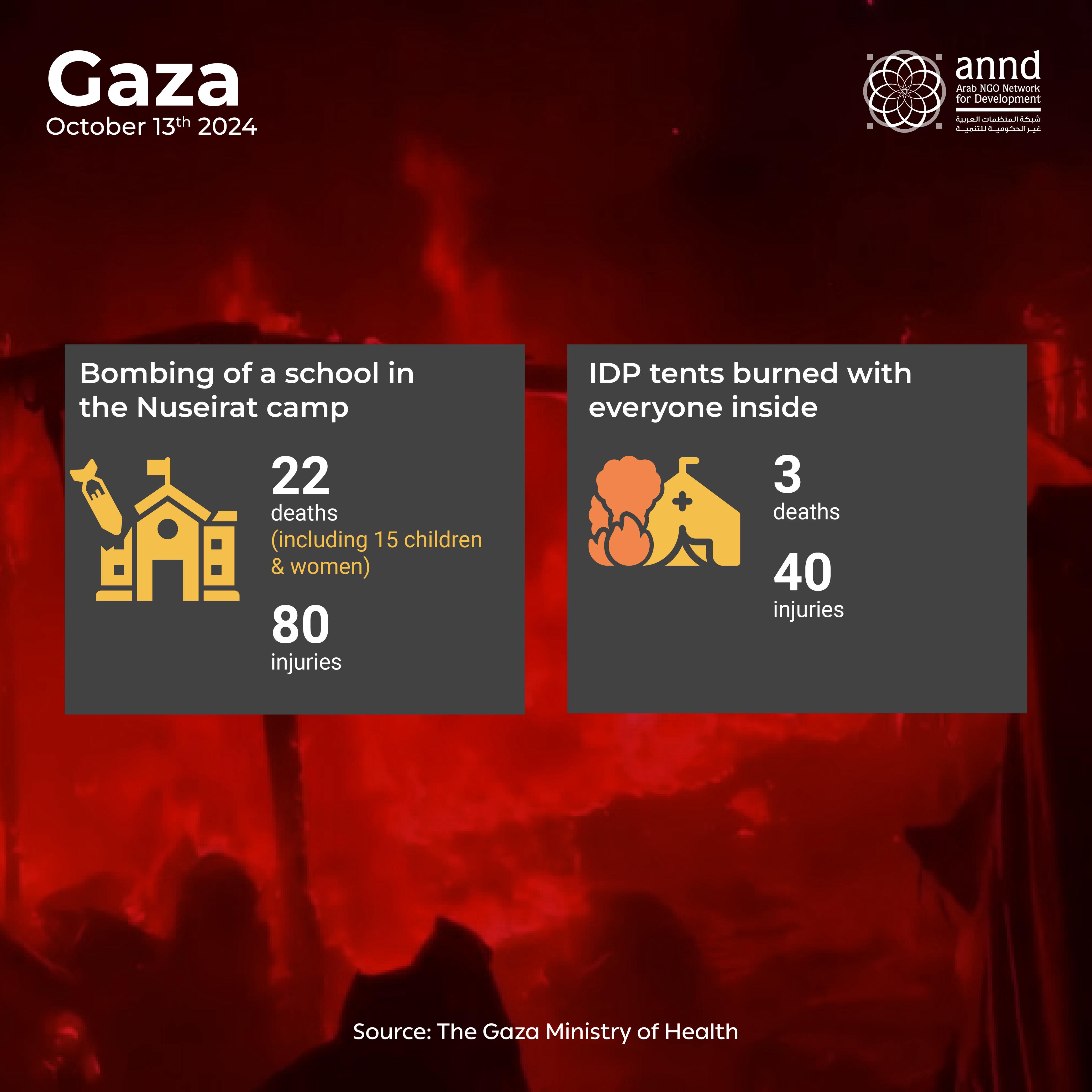
The United Nations Humanitarian Coordinator for the Occupied Palestinian Territories stated in a press release that "Israeli forces are committing another massacre in the northern Gaza Strip, where Palestinians in Jabalia are being brutally and sadistically killed using advanced weapons funded and supported by Western countries." She added that Israeli military operations in Jabalia have killed dozens of civilians, mostly women and children, as part of an intensified military campaign launched by Israel on northern Gaza for several days. The UN noted that humanitarian conditions in those areas are deteriorating, with difficulty in delivering medical and relief aid to the victims.
International organizations and human rights institutions have called for urgent intervention to stop the "massacres" being committed in Gaza, especially in the northern areas. They urged the international community to take responsibility and pressure Israel to halt military operations targeting civilians and infrastructure in the Gaza Strip and work to protect the Palestinian population.
Battlefield Developments in Lebanon
It was a violent day during which Israel tried to burn the memory of the people of the South and the Bekaa by targeting buildings and areas classified as heritage sites, in which internationally prohibited weapons were used. The Israeli army carried out a series of violent airstrikes in southern Lebanon, Bekaa, and Mount Lebanon, targeting the town of Bqosta (Sidon) for the first time and destroying the historic Nabatiyeh market, while relative calm continued in Beirut and its southern suburbs. The most serious Israeli action was the deliberate destruction of historical markets in Nabatiyeh, which contained 350 shops, as well as freelance offices that formed the pulse of the city and the surrounding area. Some buildings date back to the Mamluk era, with the clear goal being to erase Lebanon's heritage.
For the first time since the beginning of its ground maneuver on the Lebanese border, the Israeli army claimed it had captured a Hezbollah fighter. Israeli forces from "Brigade 8" are reportedly engaged in direct combat with Hezbollah fighters. The Israeli army spokesman, Avichay Adraee, issued a new order to evacuate 21 southern villages and towns north of the Litani River, warning residents against traveling south or returning to their homes or olive fields, declaring them dangerous combat zones. Israeli forces targeted Lebanese Red Cross ambulances in the village of Serbine – Bint Jbeil – despite coordination and approval from UNIFIL forces.
Hezbollah denied any of its fighters were captured and confirmed its continued resistance against Israeli infiltration attempts, particularly on the Ramieh front, where its fighters detonated two explosive devices against forces attempting to infiltrate. Hezbollah also continued to fire dozens of rockets at northern Israel, targeting Israeli military gatherings along the border.
The Public Health Emergency Operations Center announced that Israeli airstrikes on Lebanon on the previous day had resulted in 51 martyrs and 174 injured, distributed as follows:
- Southern Lebanon: 14 martyrs and 63 injured
- Nabatiyeh: 10 martyrs and 50 injured
- Bekaa: 3 martyrs and 11 injured
- Baalbek-Hermel: 13 injured
- Mount Lebanon: 22 martyrs and 33 injured
- North Lebanon: 2 martyrs and 4 injured
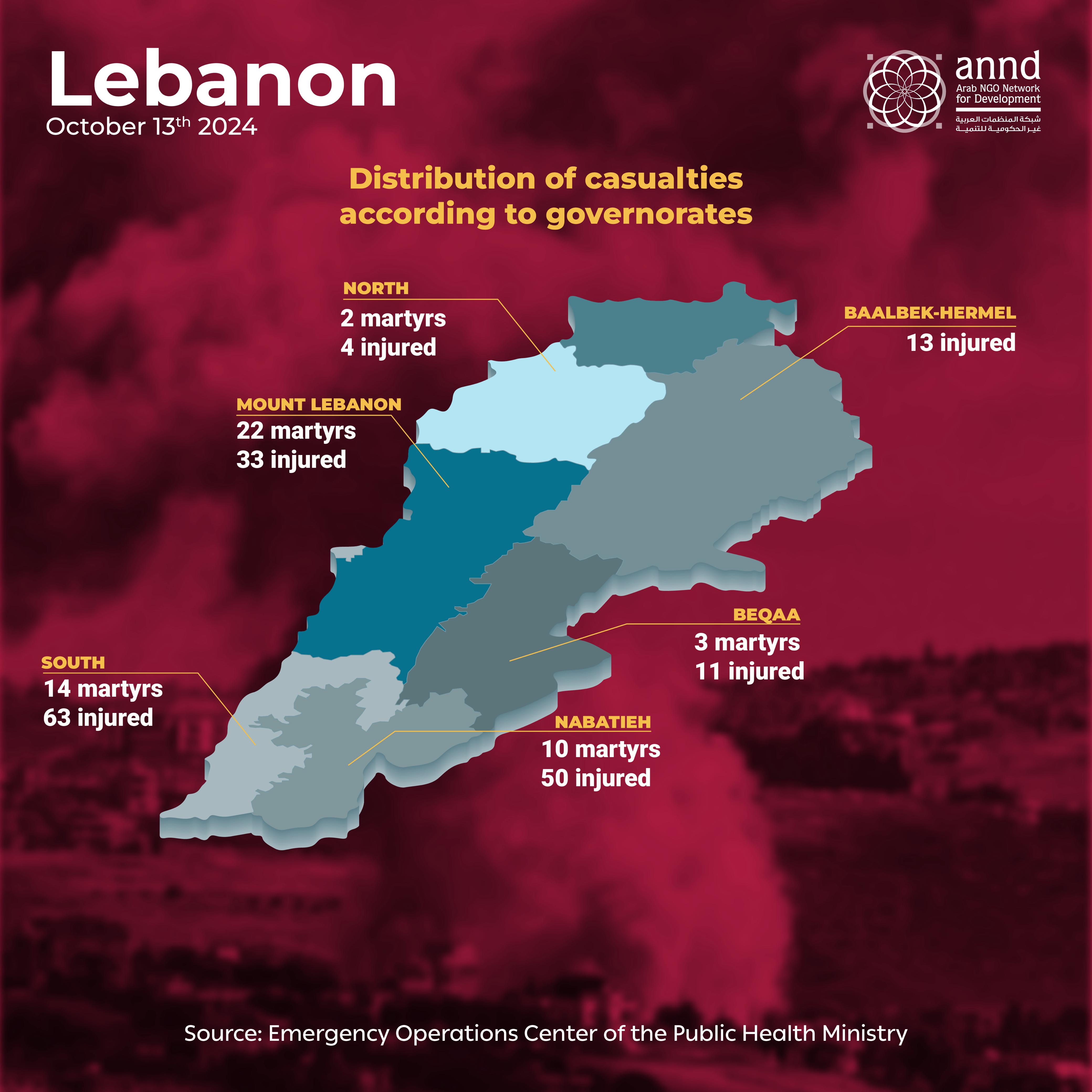
This brings the total death toll since the start of the aggression to 2,306 martyrs, and the number of wounded to 10,698.
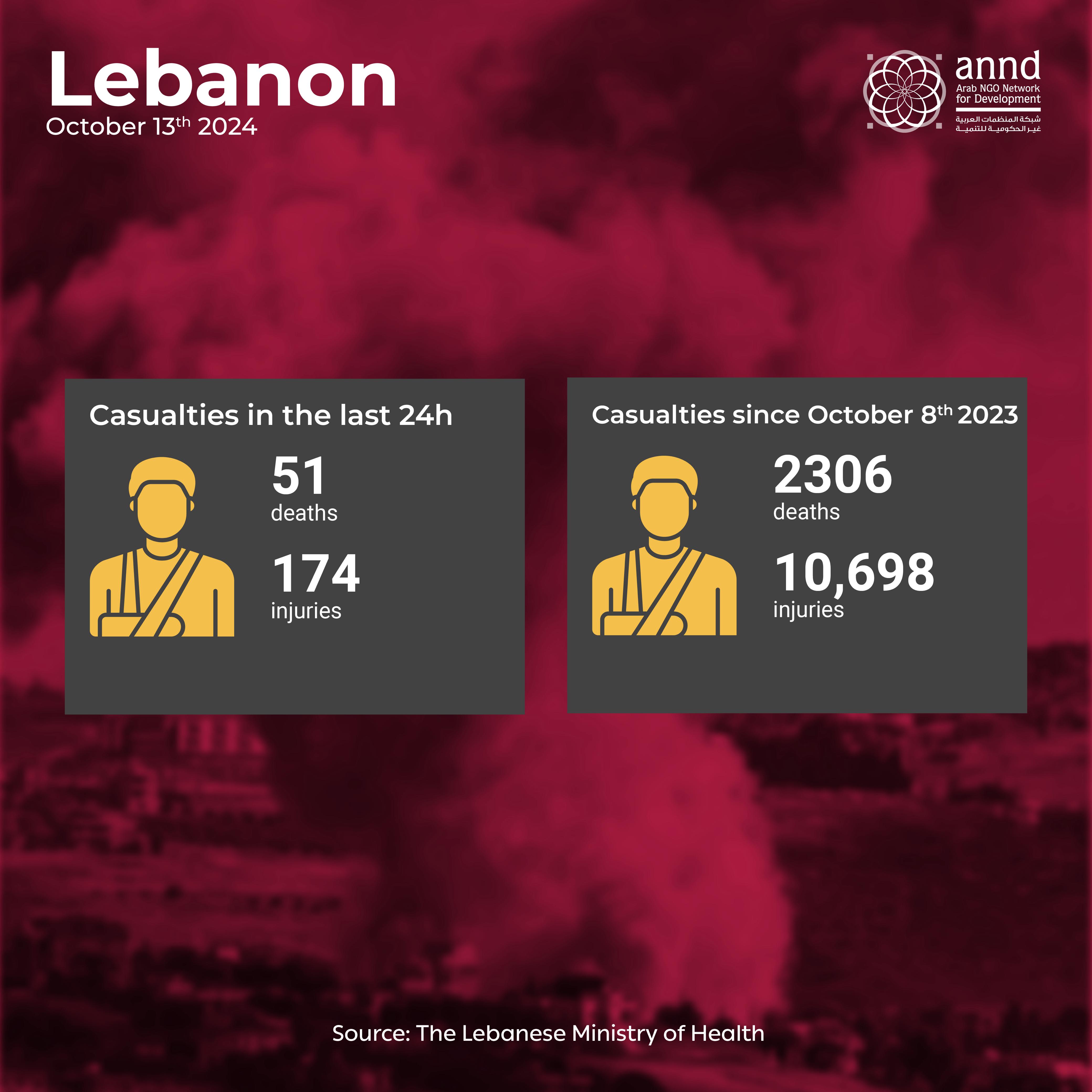
Political Positions in Lebanon
Lebanese Prime Minister Najib Mikati issued a statement condemning Israeli Prime Minister Netanyahu’s stance and the Israeli aggression against UNIFIL. He reaffirmed Lebanon's commitment to international legitimacy, UN Resolution 1701, and the role of the United Nations Interim Force in Lebanon (UNIFIL) in cooperation with the Lebanese army. He called on the international community to take a firm stance to stop Israeli aggression against Lebanon and international legitimacy.
The discussion continues around the presidential initiative (Ain El-Tineh statement, named after the headquarters of the Speaker of the House), which calls for separating Gaza from Lebanon, enforcing a ceasefire, implementing UN Resolution 1701, deploying the Lebanese army in the south, and electing a president. Opinions vary between those who seek to turn it into a national initiative (MP Wael Abu Faour) and those who call for full implementation of Resolution 1701, particularly its article on disarmament (Opposition MP Michel Moawad, leader of the Independence Movement).
Economic expert Dr. Elie Yachoui, former dean of the Faculty of Economics at Saint Joseph University, estimated that losses to date amount to around $18 billion, equivalent to Lebanon's national income. The losses affected sectors such as agriculture ($3 billion), industry ($2 billion), tourism ($2 billion), in addition to material damage to buildings and properties ($8 billion) and a stop in transfers from expatriates ($3 billion). He also forecasted negative growth, stressing that an immediate ceasefire is necessary to avoid reaching the point of no return.
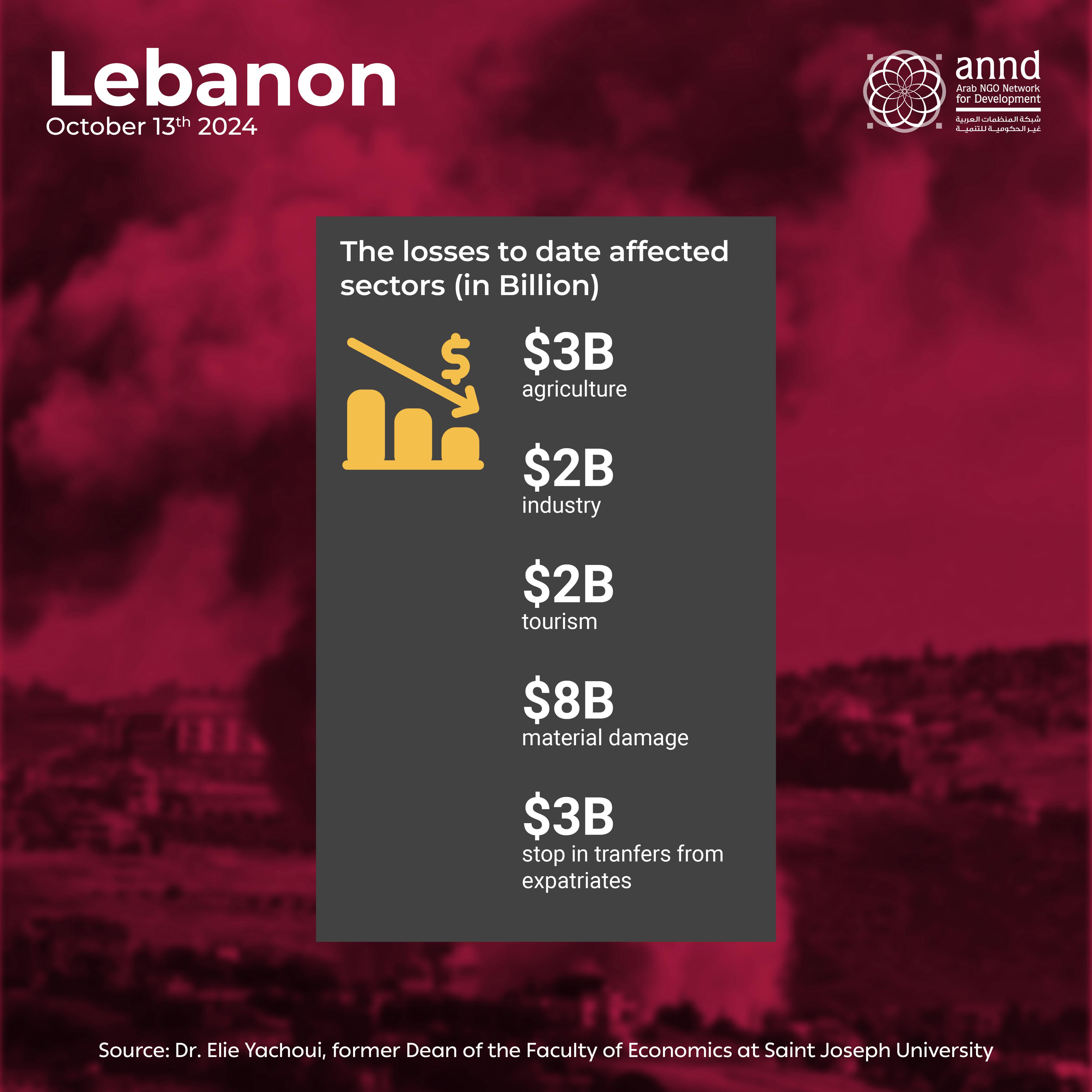
The head of the Beirut Traders Association stated that one-third of Lebanese are working, another third have become displaced, and the final third have lost their jobs without being displaced due to economic recession. This dire reality pushes Lebanon into a deadly phase.
The head of the Lebanese Pharmacists Syndicate, Joe Salloum, announced difficulties in importing medicines because Beirut’s airport has been restricted to civilian aircraft only, and aid shipments to Lebanon are not reaching pharmacies. Out of 3,400 pharmacies, one-third have ceased operations, and about 400 to 500 pharmacies are still functioning under extremely challenging conditions in areas under attack. He called on the Red Cross, UNIFIL, the risk management unit, and the government to develop a plan to extract medicines from closed pharmacies in coordination with the syndicate and pharmacy owners.
Maronite Patriarch Cardinal Bechara Boutros Al-Rahi called on the Lebanese to be "the seeds of peace in the winter of war."
Humanitarian Response in Lebanon
A Saudi plane carrying 40 tons of relief and medical aid arrived at Beirut airport as part of a Saudi airlift from the King Salman Humanitarian Aid and Relief Center. A specialized team to assist the displaced also arrived with the plane. In his meeting with former Saudi Ambassador to Lebanon, Ali Awad Al-Asiri, Prime Minister Mikati confirmed that "Saudi aid is just the beginning, and the ambassador will be informed of Lebanon’s urgent needs." Al-Asiri noted that "the Kingdom of Saudi Arabia will spare no effort in assisting the Lebanese people, especially during these difficult times."
Qatari Ambassador to Lebanon, Saud bin Abdulrahman Al Thani, confirmed that Qatar has so far sent over 50 tons of medical relief aid and emphasized that "Qatar's support for Lebanon is ongoing and constant." Another Qatari plane loaded with medical aid for the displaced has arrived. Minister of Economy Amin Salam confirmed that aid distribution to displaced persons is being monitored to ensure it reaches those in need.
The Minister of Health announced the creation of a coordination room to manage and distribute aid with transparency and revealed that there are 850 registered safe shelters and 250 unregistered ones. The ministry provides only medicines, while other needs are being met through personal efforts and the actions of some international donors. Work is ongoing to ensure the sustainability of support.
UNICEF’s Executive Director stated in an interview with CNN that the situation in Lebanon is testing the organization's capacity, and it certainly needs more resources to respond effectively.
International Positions
The Iraqi Foreign Minister warned of the expansion of Israel's war in the Middle East to include Iran, which “threatens energy sources and creates a global crisis.” He emphasized in a press conference with his Iranian counterpart in Baghdad that the Iraqi government rejects the “use of Iraqi airspace as part of the war zone,” stating that “the Iraqi government has no decision to go to war.”
Israeli Defense Minister stated from Lebanon's border: “We will not allow Hezbollah to return to the area, even after our forces leave southern Lebanon.”
The Israeli army has elevated the rank of personnel authorized to approve the use of heavy weaponry, amid a reduction in ammunition and embargoes on arms exports to the Israel.
The attacks on international peacekeeping forces continue, with Israeli pressure for their withdrawal from the area of operations:
- The U.S. Department of Defense (Pentagon) expressed deep concern over the Israeli army's targeting of UNIFIL sites. In a statement, Defense Secretary Lloyd Austin stressed in a call with his Israeli counterpart Yoav Gallant the need to ensure the safety and security of the United Nations Interim Force in Lebanon (UNIFIL) and the Lebanese Armed Forces.
- UNIFIL forces reported three Israeli army groups crossing the Blue Line into Lebanon, stopping the logistical movement of their forces near the town of Mais al-Jabal and preventing them from completing their mission. In a statement issued on Sunday, UNIFIL confirmed that any deliberate attack on peacekeepers constitutes a serious violation of international humanitarian law and UN Resolution 1701. The statement added that UNIFIL has requested an explanation from the Israeli army for these grave violations.
- The UN Secretary-General emphasized the necessity of ensuring the safety and security of UN personnel and property and respecting the inviolability of UN premises at all times, without restriction. He stressed that attacks on peacekeepers constitute a violation of international law, including international humanitarian law, and could amount to a war crime. He reiterated the call for an end to hostilities and the full implementation of UN Security Council Resolution 1701.
- Israeli Prime Minister Benjamin Netanyahu announced that the refusal to withdraw UNIFIL forces from southern Lebanon means leaving them as hostages in the hands of Hezbollah, putting their lives and those of Israeli soldiers at risk. He urged the UN Secretary-General to relocate UNIFIL forces from combat zones in Lebanon.
- Israel's envoy to the UN considered the organization's insistence on keeping UNIFIL soldiers in the line of fire as incomprehensible.
